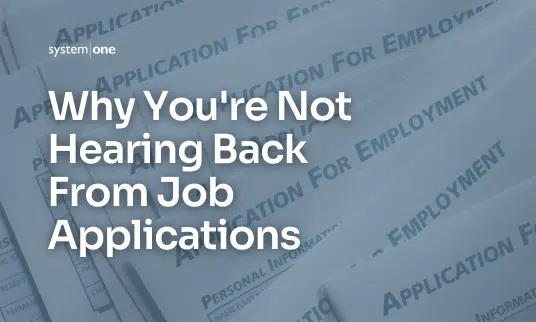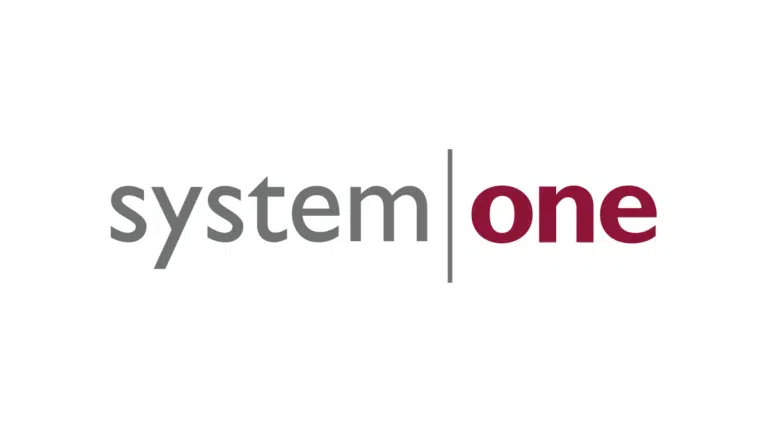Why You’re Not Hearing Back From Job Applications

Job hunting can be frustrating, especially when you're sending out countless applications but not getting any responses. Often, it's not about your qualifications but how you present them. Here are a few common reasons why your resume might be falling through the cracks.
You're Not Working with a Recruiter
In today's competitive job market, submitting your resume to job boards isn't always enough. When you work with a recruiter, like our expert recruiters at System One, you benefit from their exclusive relationships with large private and public organizations. These relationships give you access to job opportunities that haven't been listed on job boards yet, giving you a competitive edge.
These recruiters have direct relationships with hiring managers, meaning your resume is more likely to be seen by the right people.
Beyond just getting your resume in front of the right eyes, recruiters (especially System One recruiters) offer invaluable guidance. They can help you tailor your resume to emphasize the most relevant skills for the jobs you're applying for. Recruiters know what hiring managers want to see in candidates, giving you a huge advantage. By working with a recruiter, you're ensuring your resume is not just another one lost in the shuffle. Check out our previous episode of Sound Off with System One, "Maximize Your Job Search: How Recruiters Can Help You Land Your Dream Job," for more pro tips on working with a recruiter.
Your Resume Isn't Optimized for Recruiting Software
Even if you have the perfect qualifications, your resume might not make it past the Applicant Tracking System (ATS) if it's not properly optimized. Most companies use ATS to screen resumes before a human even looks at them. This means your resume must be structured in a way that these systems can easily read and process.
One common mistake is not tailoring your resume for the specific job you're applying to. This includes using keywords from the job description, emphasizing your most relevant experiences first, and ensuring your resume isn't too long.
A well-optimized resume lists key skills and accomplishments upfront and uses clear, simple formatting. Avoid graphics, complex tables, or unusual fonts that could confuse the software. Instead, stick to a clean, keyword-rich resume that highlights the qualifications the job requires. A recruiter can easily assist you in ensuring your resume is tailored to the job description, but be sure to check out our article, "Why Your Resume Isn't Getting Recognized: Top Tips to Optimize for ATS" to get started.
You Don't Meet the Qualifications (Yet)
Sometimes, you don't meet the job requirements, but if you frame your mindset to look at it as an opportunity, it will get you ahead. Job markets evolve quickly, and you can, too. This is where learning platforms like Coursera, LinkedIn Learning, or even certification programs come in.
Taking courses to improve or develop new skills shows initiative and the willingness to adapt, both of which are soft skills that employers value. Whether it's brushing up on software you're unfamiliar with or acquiring new project management skills, continuous learning keeps you competitive. Even if you're not yet the perfect fit for a role, demonstrating that you're actively expanding your skill set could tip the scales in your favor.
Additionally, make sure to highlight your passion for learning and professional growth in your resume and cover letter. This positions you as someone invested in improving and adapting, which can appeal to employers, even if you don't check every box.
Other Key Tips to Consider
Follow-Up Strategically
If you haven't heard back within a reasonable time frame, don't hesitate to follow up. A polite email inquiring about the status of your application can reaffirm your interest in the role. Keep in mind that recruiters and hiring managers have a lot to juggle, so be sure to strike the right balance between showing genuine interest in the role and following up incessantly.
Network Within the Company
Sometimes, a connection within the company can make all the difference. Use LinkedIn and in-person networking events when possible to connect with employees or hiring managers at your target companies. Be sure to mention the referral when appropriate!
Keep Track of Your Applications
It's helpful to keep a detailed log of where you've applied and when. This can guide you in your follow-up efforts and help you stay organized during the job hunt.
Conclusion
Not hearing back from your job applications can be incredibly frustrating when you've put forth a substantial amount of effort into the job search process. If you go about it with the right strategy, that time will not be wasted. By connecting with a recruiter, optimizing your resume, and continuously improving upon your skillsets, you will see a significant difference in application responses and overall job search success.
Looking for business solutions?
Explore System One
